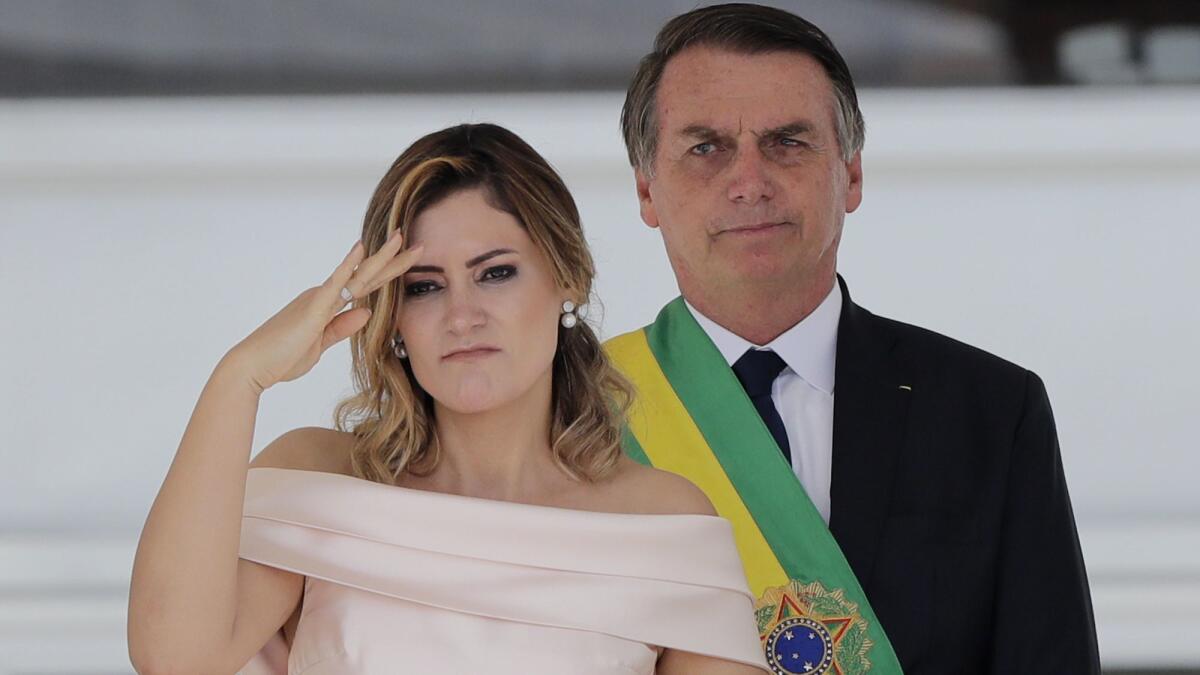Far-right leader Jair Bolsonaro is sworn in as Brazilâs president

With a high-level U.S. delegation in attendance, former army captain Jair Bolsonaro was sworn in Tuesday as president of Brazil, a post he won in a landslide election victory despite bombastic statements.
Bolsonaro, who has expressed admiration for military dictatorships and insulted women, people of color and the gay community, took office in an elaborate swearing-in ceremony in the Brazilian capital, Brasilia, and promised to immediately shake up his nationâs status quo.
The unlikely ascent to power of Bolsonaro â an avowed fan of President Trump â marks a hard shift to the right in Latin Americaâs largest country, which has been ruled by leftist or centrist governments since the end of military rule more than three decades ago.
Trump made a congratulatory phone call to Bolsonaro soon after his election in October, and he was quick on the mark again Tuesday.
Minutes after Bolsonaroâs inauguration, Trump tweeted his good wishes: âCongratulations to President @JairBolsonaro who just made a great inauguration speech â the U.S.A. is with you!â
Bolsonaro stuck to many of the same far-right positions, pledging to fight the teaching in schools of what he calls âthe ideology of genderâ and to end violence by shielding all police from prosecution for use of excessive force.
He also vowed to âconstantly ask God for guidanceâ as he governs and to confront leftist militancy, stamping out what he calls cultural Marxism that he contends has spread through Brazil because of its leftist governments.
âThis is the beginning of Brazilâs liberation from socialism, political correctness and a bloated state,â Bolsonaro said.
âWe have the great challenge of taking on the effects of an economic crisis, of facing the distortion of human rights and the breakdown of the family,â he said.
Like a growing club of world leaders, Bolsonaro â who survived a stabbing during the campaign â rode a wave of popular discontent to victory, making populist promises along the way and vowing to upend Brazilian politics. Brazil has suffered from rampant corruption scandals; the nationâs first female president was impeached on corruption charges, and her predecessor is in jail on a corruption conviction.
Bolsonaro, who served in Congress for years, faces an economy reeling from its worst recession in history. While generally favoring free-market policies, he will also probably be forced to accommodate demands from Brazilâs biggest industries, many state-run.
Delegations from numerous countries attended the ceremony Tuesday, including one from the U.S. led by Secretary of State Michael R. Pompeo. Members of the Trump administration say they have confidence Bolsonaro will not derail Brazilâs democracy, as many Brazilians, outside observers and human rights activists fear.
Bolsonaro disinvited three presidents â all leftists â to whom his predecessors had sent invitations: Nicolas Maduro of Venezuela, Miguel Diaz-Canel of Cuba and Nicaraguaâs Daniel Ortega.
The three countries are on the Trump administrationâs blacklist for what it describes as corruption and egregious human rights abuses.
A Brazil led by a far-right president has been cited by senior administration officials as the kind of government they can partner with. Bolsonaro has already announced plans to work more closely with the United States, especially to counter Venezuela.
Two of the attendees who perhaps traveled the farthest to reach Brasilia on Tuesday are also right-wing politicians: Israeli Prime Minister Benjamin Netanyahu and Hungarian Prime Minister Viktor Orban.
Netanyahu has formed a warm relationship with Bolsonaro, in part because he has vowed to move the Brazilian Embassy in Israel to Jerusalem.
Netanyahu praised Bolsonaro as a âgood friend.â He and Pompeo met on the sidelines of the inauguration to discuss security, including Trumpâs abrupt order to withdraw U.S. troops from Syria.
Pompeo, appearing alongside Netanyahu before the inauguration, told reporters he had assured the Israeli leader that ânothing will changeâ in U.S. efforts to keep Israel safe.
âThe decision the president made on Syria in no way changes anything that this administration is working on alongside Israel,â Pompeo said, noting that the fights against the militant group Islamic State and Iranian âaggressionâ continue.
âOur commitment to Middle East stability and the protection of Israel continues in the same way it did before that decision was made,â Pompeo said.
A swift withdrawal ofU.S. forces from Syria is expected to bolster Iran, as well as Russia and Syrian President Bashar Assad, whose removal was an original goal of the U.S.-backed insurgency. And it could leave Israel more vulnerable to attack.
Later, both Pompeo and Netanyahu met with Honduran President Juan Orlando Hernandez. The three agreed to boost trilateral economic and political relations, and Hernandez promised to put a new Honduran Embassy in Israel in Jerusalem, according to a statement from the U.S. State Department.
After the inauguration, Pompeo and Bolsonaro shook hands and hugged.
More to Read
Sign up for Essential California
The most important California stories and recommendations in your inbox every morning.
You may occasionally receive promotional content from the Los Angeles Times.










